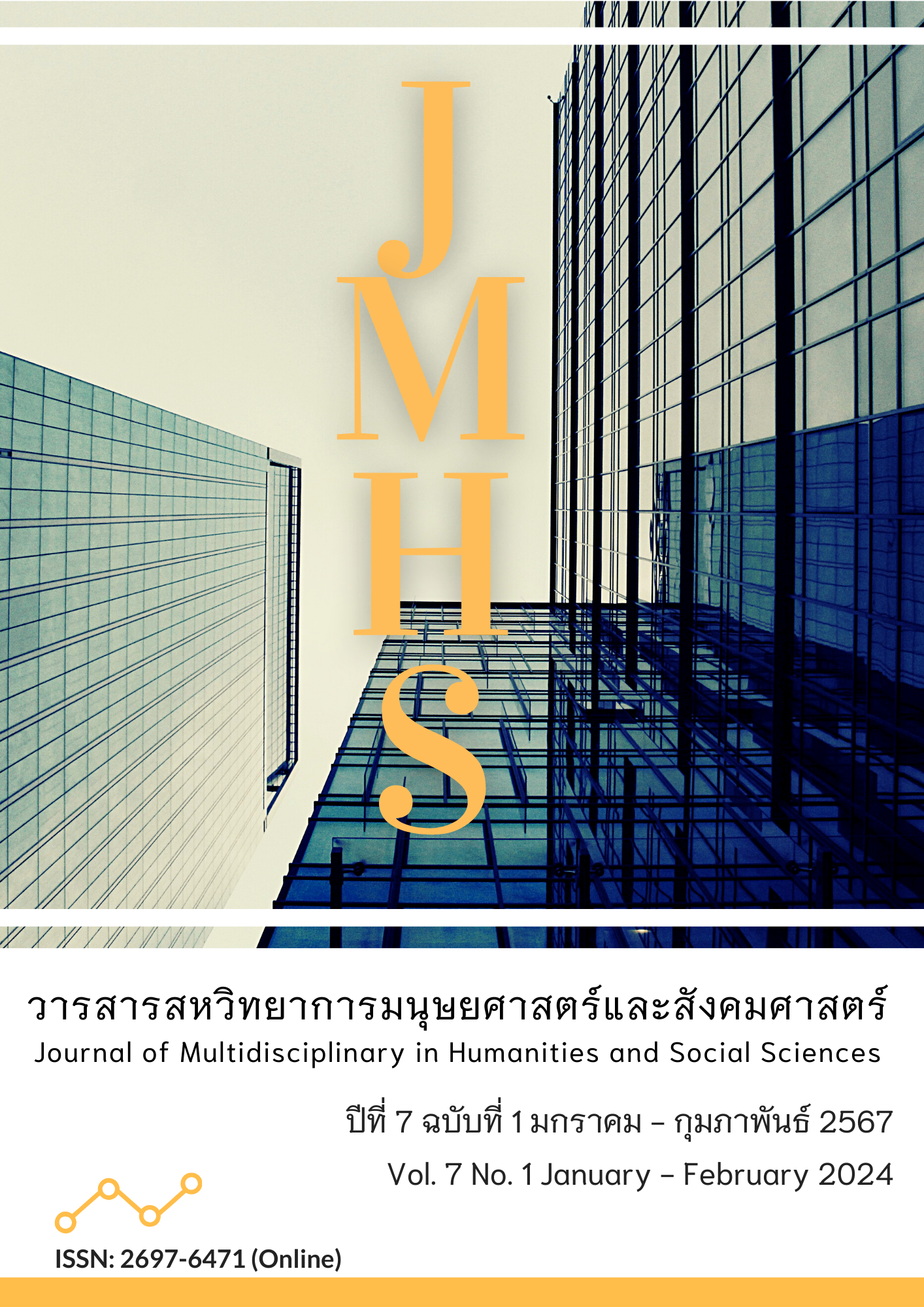Development and Examine Psychometric Properties of Active Citizenship Scale for Senior High School Students under The Secondary Educational Service Area Office Bangkok
Main Article Content
Abstract
This Article aimed to 1) study behaviors indicating active citizenship among senior high school students and 2) develop a measure and examine the psychometric properties of the active citizenship scale for senior high school students. The research format is descriptive research with qualitative and quantitative data analysis. The sample group is 1,989 senior high school students studying in secondary school under The Secondary Educational Service Area Office Bangkok, using a multi-stage random sampling. The research instrument was the Active Citizenship Scale, which is a situational scale with 40 items that had been quality checked. The analysis showed that the Item Objective Congruence Index between 0.60 to 1.00, discrimination index is between 0.263 to 0.847 and item reliability was 0.952. Data were analyzed using content analysis, basic statistics, confirmatory factor analysis with LISREL program, Graded-Response Model based on polytomous item response theory using IRT Pro program.
The research results were found as follows; 1. Indicators of active citizenship among senior high school students have 4 factors: Democratic Values, Community and social life, Collaborative Democracy and Proposing solutions for social change, totaling 32 indicators. The active citizenship scale has qualities based on psychometric properties, including 1) Discrimination index is between 0.221 – 0.617 slope parameter (α) or item discrimination parameter between 0.48 and 1.90 and Threshold parameter (β) or difficulty parameter between -6.37 and 3.49 2) The second order confirmatory factor analysis found that the model fit the empirical data. 3) The internal consistency reliability was 0.911, construct reliability was 0.983, and reliability from analyze Graded-Response Model was 0.920.
Article Details

This work is licensed under a Creative Commons Attribution-NonCommercial-NoDerivatives 4.0 International License.
Views and opinions appearing in the Journal it is the responsibility of the author of the article, and does not constitute the view and responsibility of the editorial team.
References
กลุ่ม Thai Civic Education. (2556). กรอบแนวคิดหลักสูตร การศึกษาเพื่อสร้างความเป็นพลเมืองในระบอบประชาธิปไตยของไทย. สืบค้นจาก http://thaiciviceducation.org/th/
ชูศรี วงศ์รัตนะ. (2560). เทคนิคการสร้างเครื่องมือวิจัย : แนวทางการนำไปใช้อย่างมืออาชีพ. กรุงเทพฯ: ศูนย์หนังสือแห่งจุฬาลงกรณ์มหาวิทยาลัย.
ปณสาส์น ตั้งเจริญ และ ศรัณย์ พิมพ์ทอง. (2561). สถานการณ์ทางสังคมและจิตลักษณะที่เกี่ยวข้องกับพฤติกรรมการเป็นพลเมืองใส่ใจสังคมของนิสิตระดับปริญญาตรี มหาวิทยาลัยศรีนครินทรวิโรฒ. วารสารพฤติกรรมศาสตร์เพื่อการพัฒนา, 10(1), 146-165. สืบค้นจาก https://so02.tci-thaijo.org/index.php/JBSD/article/view/90199
ประสพชัย พสุนนท์. (2557). ความเชื่อมั่นของแบบสอบถามในการวิจัยเชิงปริมาณ Reliability of Questionnaire in Quantitative Research. วารสารปาริชาต มหาวิทยาลัยทักษิณ, 27(1), 144-163. สืบค้นจาก https://so05.tci-thaijo.org/index.php/parichartjournal/article/view/43033/35612
ประสพชัย พสุนนท์. (2558). ความเที่ยงตรงของแบบสอบถามสำหรับงานวิจัยทางสังคมศาสตร์ Validity of Questionnaire for Social Science Research. วารสารสังคมศาสตร์ มหาวิทยาลัยศรีนครินทรวิโรฒ, 18, 375-396. สืบค้นจาก http://ejournals.swu.ac.th/index.php/JOS/article/view/7044/6558
พสชนัน นิรมิตรไชยนนท์. (2560). รูปแบบการเสริมสร้างความเป็นพลเมืองที่ตื่นตัวตามระบอบประชาธิปไตย สำหรับประชาชนทุกช่วงวัยในกรุงเทพมหานคร. วารสารรัฏฐาภิรักษ์, 50(3), 47-61. สืบค้นจากhttp://www.thaindc.org/images/column_1462775465 /Rattha%20V3_2017-low.pdf
พิณสุดา สิริธรังศรี. (2560). การพัฒนาการศึกษาเพื่อความเป็นพลเมือง. วารสารสุทธิปริทัศน์, 31(100), 100-113. สืบค้นจาก https://so05.tci-thaijo.org/index.php/DPUSuthiparithatJournal/article/download/243549/165262/
มูลนิธิสยามกัมมาจล ธนาคารไทยพาณิชย์ จำกัด (มหาชน). (2559). พลังพลเมืองเยาวชนภาคตะวันตก Young Active Citizen. นนทบุรี: เอส.อาร์.พริ้นติ้ง แมสโปรดักส์.
วรรณชลี โนริยา. (2560). การวิเคราะห์องค์ประกอบของการเสริมสร้างความเป็นพลเมืองที่ตื่นตัวในพื้นที่ตั้งจังหวัดน่าน. วารสารการเมืองการปกครอง, 7(2), 132-160. สืบค้นจาก http://copag.msu.ac.th/journal/filesjournal/7-2/31072017115921.pdf
วสันต์ สรรพสุข. (2565). การพัฒนาหลักสูตรเสริมสร้างสมรรถนะการเป็นพลเมืองที่เข้มแข็งตามแนวคิดการศึกษาเชิงวิพากษ์สำหรับนิสิตวิชาชีพครู. วารสารศึกษาศาสตร์ มหาวิทยาลัยมหาสารคาม, 10(3), 139-153. สืบค้นจาก https://so09.tci-thaijo.org/index.php/JOEMSU/article/view/274
สำนักกรรมาธิการ 2 สำนักงานเลขาธิการวุฒิสภา ปฏิบัติหน้าที่สำนักงานเลขาธิการสภานิติบัญญัติแห่งชาติ. (2561, 2 สิงหาคม). รายงานการพิจารณาศึกษา เรื่อง “การเสริมสร้างความเป็นพลเมืองตามระบอบประชาธิปไตย”. สืบค้นเมื่อ 22 มีนาคม 2566, จาก https://www.senate.go.th/document/Ext18904/18904889_0003.PDF
สำนักงานคณะกรรมการการศึกษาขั้นพื้นฐาน. (2564, 4 ตุลาคม). สมรรถนะการเป็นพลเมืองที่เข้มแข็ง. สืบค้นเมื่อ 22 มีนาคม 2566, จาก https://cbethailand.com/หลักสูตร-2/กรอบหลักสูตร/สมรรถนะหลัก-6-ประการ/สมรรถนะการเป็นพลเมืองท/
สำนักงานเลขาธิการสภาการศึกษา. (2559). รายงานการวิจัยเพื่อจัดทำข้อเสนอเชิงนโยบายการพัฒนาการศึกษาเพื่อสร้างความเป็นพลเมือง. กรุงเทพฯ: สำนักงานเลขาธิการสภาการศึกษา.
อิทธิพัทธ์ สุวทันพรกูล. (2561). การวิจัยทางการศึกษา : แนวคิดและการประยุกต์ใช้ = Educational research : Concepts and applications. กรุงเทพฯ: จุฬาลงกรณ์มหาวิทยาลัย.
Baker, F.B. (2001). The Basics of Item Response Theory. (2nd ed.). College Park, MD. ERIC.
Hoskins, B. (2006). Draft Framework for Indicators on Active Citizenship. Ispra: CRELL.
Hoskins, B., & Mascherini, M. (2009). Measuring Active Citizenship Through the Development of a Composite Indicator. Social Indicator Research, 90, 459–488. http://dx.doi.org/10.1007/s11205-008-9271-2
Hu, L.-t., & Bentler, P. M. (1999). Cutoff Criteria for Fit Indexes in Covariance Structure Analysis: Conventional Criteria Versus New Alternatives. Structural Equation Modeling, 6(1), 1–55. https://doi.org/10.1080/10705519909540118
Kansu, C. C. & Öksüz, Y. (2014). Developing an Active Citizenship Scale for the Fourth Grade Primary School Students. Anthropologist, 18(3), 969-980. DOI: 10.31901/24566802.2014/18.03.35
Nunnally, J.C. (1978). Psychometric Theory. (2nd ed.). New York: McGraw-Hill.
Westheimer, J. & Kahne, J. (2004). What Kind of Citizen? The Politics of Educating for Democracy. American Educational Research Journal, 41(2), 237-269. https://journals.sagepub.com/doi/10.3102/00028312041002237
Zaff, J., Boyd, M., Li, Y., Lerner, J. V., & Lerner, R. M. (2010). Active and Engaged Citizenship: Multi-group and Longitudinal Factorial Analysis of an Integrated Construct of Civic Engagement. Journal of Youth and Adolescence, 39(7), 736–750. https://doi.org/10.1007/s10964-010-9541-6


